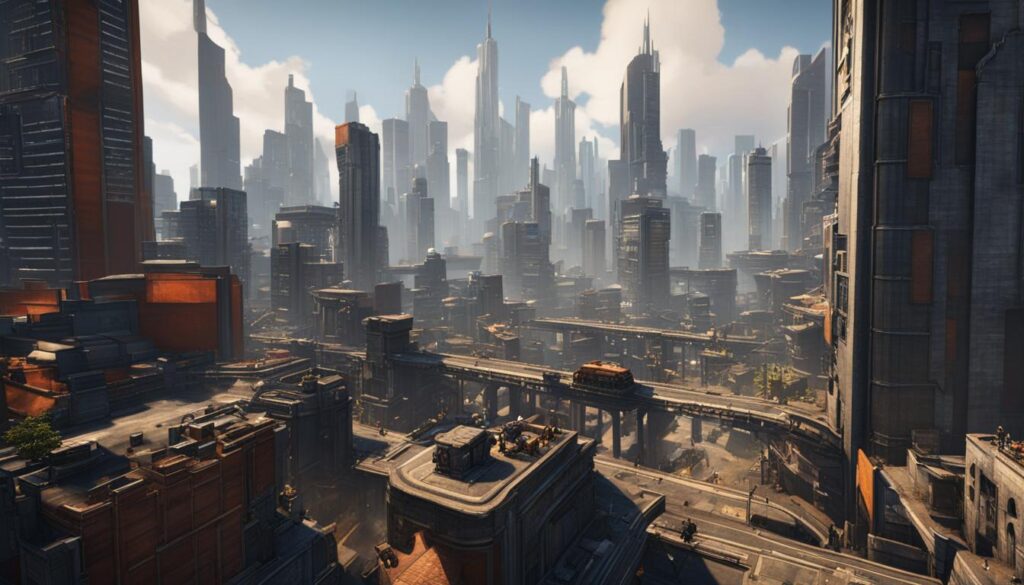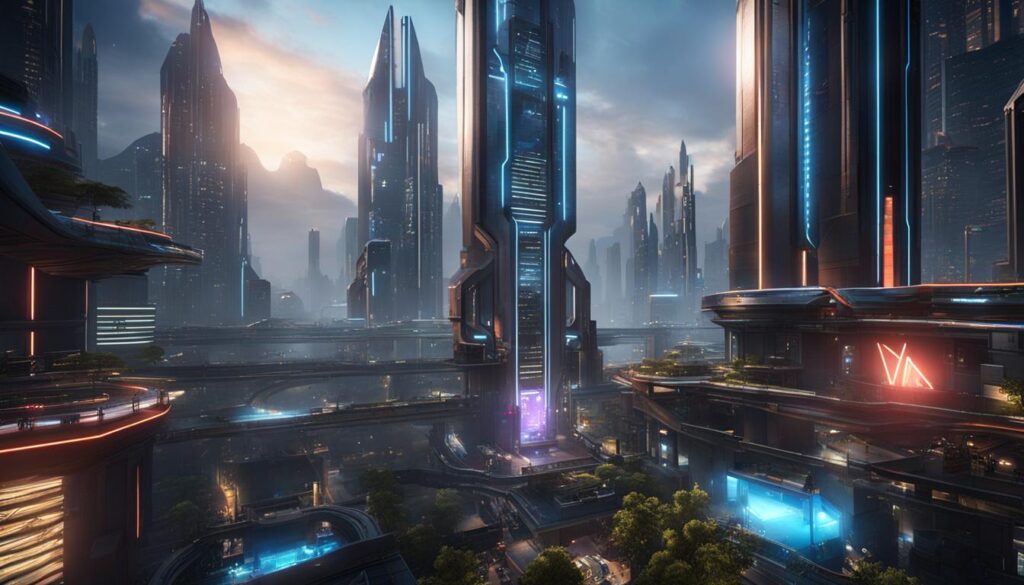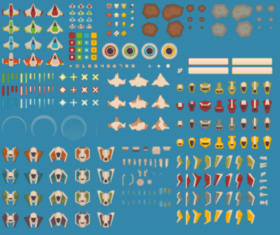The gaming industry’s continuous upsurge demands cutting-edge tools to turn inventive concepts into virtual realities. As we begin 2024, the selection of the best engine to learn game development plays a pivotal role in shaping the futures of burgeoning developers. The gaming realm offers a plethora of top game development engines for learning, tailored to every skill level—from the humble beginner to the seasoned professional. These engines don’t just facilitate the crafting of games; they act as comprehensive game design learning platforms.
For those eager to learn game design online, choosing the right software can be as crucial as the development process itself. Each engine is equipped with unique features to streamline the creation of captivating game experiences. With the industry’s swift evolution, the best game design engine for you will be the one that balances simplicity with depth, empowering you to bring your game visions to life with precision and flair.

Key Takeaways
- Identify which game development engine best suits your project and skill level.
- Explore engines that offer a mix of ease-of-use and comprehensive features.
- Utilize platforms that provide vast learning resources and community support.
- Consider engines that are specifically designed for beginners in game development.
- Evaluate cross-platform support to maximize the potential reach of your game.
- Investigate whether the engine offers free options or requires licensing fees.
- Choose an engine with an active marketplace or asset store for additional resources.
Emerging Trends in Game Development Engines
The market has an array of popular engines to learn game development that cater to different objectives and proficiency levels. These engines are not just tools; they have evolved into ecosystems supporting innovation, collaboration, and learning. Beginner game developers have the luxury of choice to select an engine that best aligns with their knowledge level, which helps overcome the barriers to entry into the world of game design and development.
Moden game development engines have become increasingly more adaptabil to users needs and requirments. This is achieved in user-friendly interfaces, extensive support communities, and a wealth of online resources. The beginner game developer today can harness these engines to create immersive game experiences that were once the domain of large studios. This democratization of game development is encouraging a new wave of indie developers, poised to shape the future of gaming.
Below, I’ve put together a simple comparison of the best game engines for new developers to start and grow their game ideas into fun, playable adventures.
| Game Engine | Key Advantage for Beginners | Supportive Features | Notable Games |
|---|---|---|---|
| Unity | Free for annual revenue under $100K | Cross-platform support, VR/AR capabilities | Genshin Impact, Hollow Knight |
| Unreal Engine | Blueprint visual scripting | High-end graphics, cross-platform | Fortnite, Street Fighter V |
| GameMaker | Drag-and-drop development | Beginner-friendly, strong for 2D games | UNDERTALE, Forager |
| CryEngine | Stunning graphics with real-time editing | Extensive environment creation tools | Crysis Series, Ryse: Son of Rome |
| Phaser | Open-source and browser-focused | Strong for 2D mobile and browser games | Pickem’s Tiny Adventure, Magikmon |
| Godot | Completely free and open-source | Unique node system for easier development | Gun-Toting Cats, ProtoCorgi |
These engines are more than just tools; they’re gateways to a vibrant community and a wealth of learning resources. This helps many self-taught developers and enthusiasts bring their game ideas to life, leading to a wide range of new digital experiences. The choice of engine often depends on the project size, goals, and how easy it is for beginners to learn.
Whether it’s flying through fantasy worlds or solving puzzles in pixel games, the variety and creativity in game development engines let creators turn their big ideas into the games of the future.
Unity: A Versatile and Popular Choice
Amidst a sea of game development engines, Unity shines for its versatility and popularity, particularly among beginner game developers. Unity’s prowess in facilitating both 2D and 3D game development, including VR and AR, stems from its comprehensive toolkit and accessible SDKs, positioning it as a prime choice for those looking to learn game design online. For newcomers embarking on the game development journey, the engine’s inclusive platform provides a blend of friendly user experience coupled with robust capabilities.

Unity’s Beginner-Friendly Features
Unity captivates newcomer enthusiasm by offering a gratis option for entrants with annual earnings lower than $100K—an appealing aspect for indie creators and hobbyists aiming to kickstart their game development career. Accompanying this beginner-friendly orientation is the Unity Asset Store, an extensive marketplace filled with resources to assist developers in enriching their games without the need for intricate asset creation from the ground up.
Cross-Platform Development with Unity
Another facet that bolsters Unity’s standing as a beginner-friendly game development engine is its seamless cross-platform development support. This innate capability allows projects to transcend boundaries, reaching audiences on Windows, macOS, iOS, and Android alike. Whether a newbie designer wishes to craft mobile experiences or expansive desktop adventures, Unity provides a coherent and efficient conduit for realizing those visions in a cross-platform game development environment.
Unity Asset Store Resources
Aspiring creators looking to learn game design online will find a treasure within the Unity Asset Store. This store, filled with both free and paid assets, helps beginners easily find game development resources, making it faster and simpler to create games.
In essence, Unity not only sparkles as a game engine for beginner game developers but also as an expansive learning platform that grows alongside its users. Its beginner-friendly nuances embody the spirit of accessible, powerful game design software—a harmonious medium through which imaginative game landscapes come to fruition.
Unreal Engine: Pushing the Boundaries of Realism
At the vanguard of high-end game graphics and sophisticated visual storytelling sits the Unreal Engine. Renowned for setting industry benchmarks, this engine is a powerhouse for developers seeking to create games with a significant emphasis on visual fidelity and attention to detail. Unreal Engine’s commitment to hyperrealistic graphics has made it the go-to choice for AAA game development, ensuring gamers are immersed in worlds that almost transcend reality.

Unreal Engine’s compatibility across multiple platforms stands out, offering developers the flexibility to launch their creations on various consoles and devices. Its dynamic lighting, physics-based particle effects, and cutting-edge post-processing effects contribute to a rich and immersive player experience. This benefit extends to VR game development, where the constraints of reality fall away, and players step into truly captivating virtual spaces.
The Unreal Engine’s user-friendly Blueprint visual scripting system makes game creation easier without needing advanced programming skills. This feature allows artists and designers to play a bigger role in developing games. Here’s some data showing why Unreal Engine is a top choice for developers:
| Feature | Description | Impact on Development |
|---|---|---|
| Cross-Platform Compatibility | Supports Windows, macOS, iOS, Android, and VR. | Widens the market reach of developed games. |
| Dynamic Lighting | Realistic illumination that adjusts dynamically in-game. | Adds depth and realism to virtual environments. |
| Blueprint Scripting | Visual scripting interface that bypasses complex coding. | Enables non-programmers to contribute to game logic and design. |
For those venturing into Unreal Engine territory, ample game design tutorials are at your disposal, propelling a wide demographic of creators towards mastering this engine. The wealth of learning resources available embodies Unreal Engine’s dedication to community and education, ensuring that knowledge around its sophisticated tools is accessible and shared.
Coupled with an active marketplace brimming with assets, the Unreal Engine equips creators with the tools necessary to construct intricate worlds without requiring every element to be built from scratch. It represents a balance of advanced capabilities and user-friendliness, earning its place at the frontier of game development technology.
GameMaker: The Accessible Path to Game Design
GameMaker is known for being easy for beginners to use, making game development accessible without needing deep coding knowledge. It’s popular among indie developers and educators for its interactive online learning environment for game design.

The Drag-and-Drop Advantage of GameMaker
One of the most appealing features of GameMaker is its intuitive drag-and-drop interface. By easing the transition into the development process, this feature has empowered countless individuals to begin crafting their own digital stories. For those who aspire to delve into game creation without prior programming knowledge, GameMaker affords a practical pathway to transform ideas into interactive experiences with minimal friction.
GameMaker’s Impact on Indie Game Development
Despite its commercial aspect, GameMaker remains a significant player in the indie scene, revered for its robust game design software tools tailored for 2D projects. Success stories like “UNDERTALE” resonate within the indie community, demonstrating how GameMaker can facilitate monumental success with a less complex approach to development. Its ongoing evolution ensures that budding designers have a platform that scales with their aspirational journey from novices to game development virtuosos.
As the landscape of game design evolves, GameMaker persists as a stronghold for creativity, unlocking the endless potential housed within the minds of those embarking on an adventure in game development. By eliminating traditional hurdles and embracing a user-centric approach, GameMaker illuminates the path for anyone ready to step into the vibrant world of game creation.
CryEngine: High-Fidelity Graphics and Advanced Toolsets
CryEngine stands out in the game development world with its amazing graphics and extensive tools. It’s great for building large, detailed worlds, helping developers realize their most visually ambitious ideas.
Known for its top-notch graphics, CryEngine delivers real-time lighting and shading effects that set new standards for visual realism in games. Its focus on high-quality graphics makes it an excellent choice for learning game development, especially for those interested in creating graphically demanding games.
Creating Immersive Environments with CryEngine
Catering to developers with an eye for sophistication, CryEngine affords an array of advanced features that elevates the standard of immersive game environments. By integrating technologies such as particle effects and global illumination, CryEngine exceeds in portraying dynamic and lifelike scenes, entrancing players with its near-photorealistic renderings.
As CryEngine is available to devs without an upfront cost, it adopts an appealing royalty-based model post-profit, making it an accessible engine for indie developers and smaller studios to begin their ventures in game creation. Such a financial model encourages experimentation and ingenuity without the immediate pressures of hefty license fees.

CryEngine’s Learning Resources and Community
Despite a reputation for a challenging learning curve, CryEngine is supported by an active and knowledgeable game development community. Enthusiasts and experts collaborate to share insights, extending a welcoming hand to those new to the platform. Within this supportive orbit, learning resources, though not as abundant as other engines, provide a solid foundation for mastering the tools of the trade.
The collaborative spirit of the CryEngine community fosters an environment where knowledge-sharing is common practice, nurturing a generation of developers equipped to navigate the engine’s complexities. The power of community insight turns the daunting process of learning robust game development software into a journey of collective growth and exploration.
While the challenge of CryEngine may appear daunting at first, the prospects it holds for creating graphically intense and cross-platform games are undeniable. It’s a testament to a robust engine that not only raises the bar for what games can visually accomplish but also demonstrates the power of communal resources in overcoming steep learning paths.
Ultimately, CryEngine stands as a bastion for those seeking to weave graphical excellence into their digital narratives. Its prowess in scripting vast, beautiful game spaces beckons artists and programmers alike, poised to fabricate virtual worlds brimming with detail and wonder—one line of code at a time.
Phaser: A Robust Framework for Browser-Based Games
Delving into the versatile realm of indie game creation, Phaser emerges as a highly resourceful open-source game engine, especially well-suited for the needs of those interested in browser-based game development and mobile game development. It’s no surprise that Phaser has discovered popularity within the community, becoming a cornerstone among game engines for learning game development.
With its latest iteration, Phaser 3, developers are introduced to an even more enriched environment, boasting enhanced features such as advanced physics and comprehensive animation support. These augmentations are harmoniously combined with Phaser’s longstanding tradition of accessibility, confirming its status as a preferred selection for creators who wish to dive into 2D game development without the burdens of unwarranted expenses.

Phaser’s dedication to maintaining a developer-friendly atmosphere is exhibited in its ease of use and extensive documentation, making it an attractive game engine for beginners. Its simplistic yet powerful coding standards offer a gentle learning curve for those new to the field and provide an interactive platform where experienced developers can also thrive and execute complex projects.
The engine’s compatibility with modern web browsers is a testament to its adaptability, ensuring that games crafted with Phaser are not only playable across various devices but also optimized for performance in the mobile landscape. Thus, it has become a jewel for developers focusing on the creation of games in an era where mobile and browser compatibility is paramount.
Here’s an encapsulation of what makes Phaser an excellent game development framework:
| Aspect | Benefits |
|---|---|
| Open-source nature | Facilitates easy accessibility and fosters community collaboration |
| Browser-focused design | Ensures games function seamlessly across diverse web platforms |
| Advancement in physics and animation | Enables the creation of complex and dynamic game mechanics |
| Accessibility for 2D development | Provides a streamlined experience for developers passionate about 2D gaming |
Ultimately, Phaser not only equips game developers with the essential tools needed to bring their visions to life but also nurtures their growth in a way that truly encapsulates the spirit of innovation. Through its inviting framework, Phaser serves as a bridge across the creative gap for aspiring game developers and stands out as a role model in the landscape of game engines designed for learning and developing engaging browser-based and mobile games.

Godot: The Free and Open-Source Alternative
Entering the game development arena can be both exciting and daunting for beginners. One engine that stands out for its ease of use and powerful capabilities is Godot, an open-source game development engine that has taken the indie development world by storm. Ideal for those searching for introductory game development engines, Godot’s appeal lies in its user-friendly environment and the capacity to cater to a spectrum of development needs without the financial burdens commonly associated with game production.
Godot’s Unique Node System
At the heart of Godot’s innovation is its unique node system, a distinguishing feature that has transformed the way developers, both novice, and experienced, approach game design. This system enables the representation of game elements in a hierarchical order, streamlining object management and scene creation. It’s conducive to rapid prototyping and experimentation, making it much less intimidating for those new to game development. With an emphasis on simplicity and flexibility, the node architecture promotes a deeper understanding and control over the game’s functionality, right from the outset.
Godot also comes equipped with a range of game design tutorials and documentation, which are essential for any developer looking to sharpen their skills. The support from the community and wealth of learning materials make it straightforward for anyone to get a grip on Godot’s features and start creating games with confidence.
Developing Cross-Platform Games with Godot
A core advantage of using Godot is the cross-platform game development capabilities it offers. From Windows and macOS to iOS and Android, Godot’s extensive platform support empowers developers to publish their games to a broad audience with minimal extra workload. This cross-platform utility echoes the demands of the modern gaming market, where developers aim to reach players across various hardware and software ecosystems.
In conclusion, Godot’s no-cost access and robust feature set position it as a foremost choice for individuals embarking on the journey of game development. Its commitment to open-source principles not only fosters a collaborative atmosphere but also provides an inclusive, budget-friendly tool for creators around the globe.
The Best Engine to Learn Game Development
Diving into game development is an exhilarating step towards joining a vibrant and ever-expanding industry. For beginners, selecting the best engine to learn game development is foundational to their creative and professional growth. Each engine presents unique opportunities and challenges, and finding the right fit is crucial for an enriching learning experience.
Criteria for Selecting the Best Engine
The journey to pick the game development engine for beginners must consider various criteria. Aspiring developers should reflect on the engine’s learning curve, whether it supports 2D or 3D creation, the availability of assets, and the strength of community support. Potential costs and royalty agreements can also factor into this critical decision, especially for those with budget constraints. When these considerations align with your objectives, they narrow down the choices to the most-suitable game engines for learning game development.
| Engine | Learning Curve | 2D/3D Support | Asset Availability | Community Support |
|---|---|---|---|---|
| Unity | Moderate | Both | Extensive (Asset Store) | Strong |
| Unreal Engine | Steep | Primarily 3D | Abundant (Marketplace) | Extensive |
| GameMaker | Easy | Primarily 2D | Limited | Medium |
| CryEngine | Challenging | Both | Good | Active |
| Phaser | Easy | 2D | Good | Medium |
| Godot | Easy to Moderate | Both | Fair | Growing |
How to Start Learning Game Development Engines
Beginning your exploration into game development engines involves cultivating the right mindset and utilizing the best resources at your disposal. Embrace the wealth of game design tutorials online which offer step-by-step guidance. Community forums are invaluable for support and problem-solving, and engaging in hands-on projects can accelerate your comprehension and ability.
It is also imperative to learn game design online at a comfortable pace, ensuring a deep understanding of the fundamentals before progressing to more advanced techniques. This incremental approach aids in mastering both the software and the art of game design simultaneously.
Whether opting for Unity for its asset-rich store and cross-platform capabilities, diving into Unreal Engine for its high-end graphics, or exploring the simplicity of Godot, each engine offers a distinct path to develop one’s skill set. Ultimately, the best game design engine is one that aligns with your game development aspirations, learning style, and the types of projects you wish to create. With determination and the right tools, the next chapter of your game development story is ready to unfold.
Conclusion
As we conclude our exploration of the best engine to learn game development in 2024, one thing is clear: the world of game creation is more accessible than ever. The engines we’ve explored not only offer powerful development capabilities but also double as state-of-the-art game design learning platforms. Whether you’re interested in producing an indie gem or a high-caliber 3D masterpiece, these engines provide not just the software, but also the education needed to turn your game concepts into reality.
The top engines for learning game development combine intuitive interfaces with deep functionality, catering to a range of developers. GameMaker and GDevelop provide an excellent starting point for beginners, easing the learning curve with an approachable design. Meanwhile, Unity and Unreal Engine deliver an array of advanced features and cross-platform support ideal for those looking to push the boundaries of game development with their complex projects.
In weighing which engine best suits your journey into game design, it’s essential to evaluate factors such as compatibility with your project’s scope, your personal learning style, and preferred development process. With a thoughtful choice among the top contenders, you set a strong foundation for your entry into the dynamic and thriving gaming industry—a journey that could lead to the creation of worlds as limitless as your imagination.
FAQ
What are the best engines to learn game development in 2024?
Some of the best engines include Unity, Unreal Engine, GameMaker, CryEngine, Phaser, and Godot. Each offers different features that cater to different needs, from beginner-friendly interfaces to high-end graphical capabilities.
Which game development engine is the most beginner-friendly?
Unity and GameMaker are widely recognized as beginner-friendly game development engines. Unity offers a comprehensive set of tools with an active community, while GameMaker simplifies the process with its drag-and-drop interface.
What emerging trends are influencing game development engines?
There’s a noticeable trend towards supporting cross-platform development and providing tools for both 2D and 3D creation. Furthermore, engines are becoming more accessible, with many offering free versions to help beginners start without upfront investment.
Can I learn game design online using these game development engines?
Absolutely! Most top game development engines have extensive online tutorials, courses, and communities that allow you to learn game design online. Unity, Unreal Engine, and Godot, in particular, have a wealth of learning materials available.
What features does Unity offer that make it suitable for beginners?
Unity provides a free version for beginners who earn less than $100K/year, a vast asset store, and a supportive community. Its user-friendly interface and cross-platform capabilities also make it a popular choice among new developers.
How does Unreal Engine stand out for game development?
Unreal Engine is known for its high-end graphical capabilities, especially in creating realistic environments. It also features a Blueprint system for visual scripting that reduces the need for extensive programming knowledge.
What makes GameMaker accessible for novice game designers?
GameMaker’s drag-and-drop interface removes the immediate need for coding, making it highly accessible for novices. Its focus on 2D game development and rich tutorials further facilitate the learning process.
Are there any game development engines that focus on 2D browser-based games?
Yes, Phaser is specifically tailored for creating 2D browser-based games. It is open-source, rich in features for web game development, and enjoys a strong reputation among indie developers focused on mobile and browser games.
What are the advantages of using the Godot engine for game development?
Godot’s main advantages include its free, open-source nature, its unique node system that makes scene and game element construction more intuitive, and the support for both 2D and 3D game development.
How should I go about selecting the best engine for my game development needs?
Consider the type of game you want to create (2D or 3D), your level of programming knowledge, the engine’s learning curve, community and documentation support, and any financial constraints you might have. Also, take advantage of free versions and educational resources to experiment and find what works best for you.




